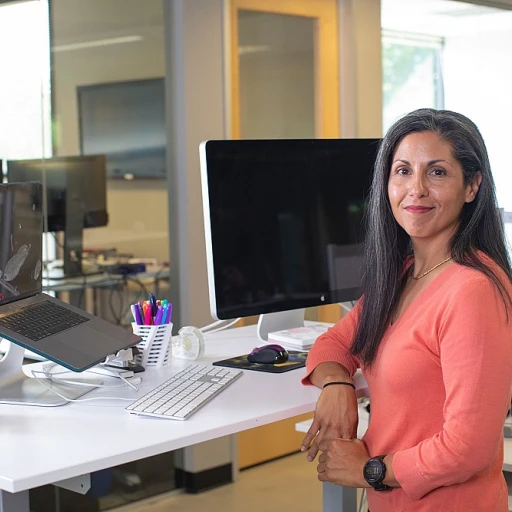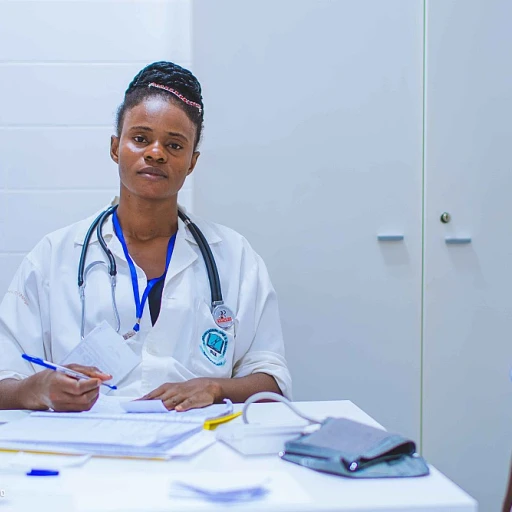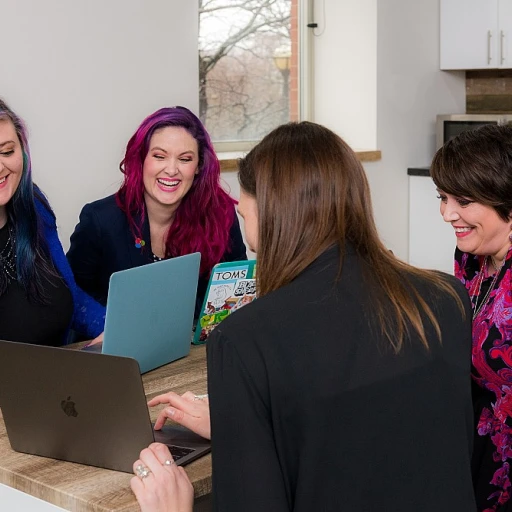Understanding Professionalism in HR Interviews
Getting the Professional Vibe Right
Understanding what it means to be professional in HR job interviews is a game-changer. It’s not just about donning a crisp suit and flashing a charming smile. It’s about infusing every aspect of the interview—from your responses to how you handle awkward lulls—with a distinct professional flavor. Why does professionalism matter? Because it’s often the lens through which hiring managers assess a candidate's ability to fit into the company culture and work environment. A candidate's demeanor in an interview can speak volumes about how they may perform as an employee. Professionalism helps candidates not only portray their skills but also how well they will integrate into a company's human resources framework. It’s about showing a potential employer that you’ve got the chops not just for the role, but for their workplace culture. Qualities of Professionalism in Interviews Wielding professionalism in an interview can mean a myriad of things, but here are some key elements to focus on:- Punctuality: Arriving on time shows you respect the interviewer’s time and sets a positive tone early on.
- Attire: Your outfit should be appropriate for the job you're applying for, giving off the vibe that you understand the role and take it seriously.
- Body Language: Maintain eye contact, offer a firm handshake, and avoid crossing your arms to convey confidence and openness.
- Listening Skills: Being an active listener during the interview can help you better assess candidate discussions and responses.
Preparing for the Interview: Setting the Professional Tone
Setting the Stage for Success
Preparing for a job interview, especially in human resources, is like setting the stage for a performance where you're both the actor and the director. The way you present yourself can speak volumes about your professionalism. It’s not just about wearing the right clothes or having a firm handshake. It’s about embodying the role you’re applying for and showing that you understand the company culture.
Researching the Company and Role
Before you step into the interview room, immerse yourself in the company’s work environment and culture. Know their mission, values, and recent news. This will help you tailor your responses to align with their expectations. Understanding the company culture can give you a leg up in answering interview questions and demonstrating your fit for the role. It's about showing that you’re not just another candidate, but the right candidate.
Preparing Your Responses
Anticipate the questions hiring managers might ask and prepare your answers. Think about your past experiences and how they relate to the job. Highlight your soft skills and hard skills, and be ready to discuss how they make you a strong candidate. Practice makes perfect, so rehearse your answers to ensure you communicate with clarity and confidence.
Showcasing Your Skills
In HR interviews, professionals often assess candidate ability to handle real-world scenarios. Be ready to showcase your problem-solving skills and how you’ve applied them in previous roles. This not only highlights your experience but also your potential as an employee who can adapt and thrive in their workplace culture.
Timing and Punctuality
Being on time is a simple yet powerful way to demonstrate professionalism. Arriving late can create a negative impression before you even begin. Plan your route, account for traffic, and aim to arrive early. This will help you start the interview process on the right foot and give you a moment to collect your thoughts.
Communicating with Clarity and Confidence
Speaking Clearly: The Power of Words
When you're in an HR job interview, how you communicate can make or break your chances. It's not just about what you say, but how you say it. A candidate's ability to articulate their thoughts with clarity and confidence is crucial. This doesn't mean you need to use fancy language or jargon. Instead, focus on being clear and concise. Think about the questions hiring managers might ask and practice your responses. This preparation will help you feel more confident and less likely to stumble over your words.
Confidence Without Arrogance
Confidence is key, but there's a fine line between confidence and arrogance. Employers want professionals who believe in their skills and can back them up with examples. When discussing your experience, use specific instances where you made a positive impact in your previous roles. This not only shows your competence but also your ability to contribute to the company's success. Remember, it's about showcasing your skills while respecting the company culture and values.
Listening: The Overlooked Skill
Communication is a two-way street. While it's important to express your thoughts clearly, it's equally important to listen. During the interview process, pay attention to the interviewer's questions and respond appropriately. This shows that you respect their role and are genuinely interested in the job. Listening carefully can also help you tailor your responses to better fit the company's work environment and culture.
Handling the Unexpected
Sometimes, interviews throw curveballs. You might be asked a question you didn't prepare for, and that's okay. Stay calm, take a moment to think, and then answer to the best of your ability. This is where your problem-solving skills come into play. Employers are not just assessing candidate knowledge, but also how you handle unexpected situations. Your ability to stay composed under pressure speaks volumes about your potential as an employee.
By mastering these communication skills, you'll not only impress the hiring team but also set the tone for a professional and successful job interview. Remember, every interaction is an opportunity to show why you're the right fit for the role.
Handling Difficult Questions with Professionalism
Staying Calm and Composed
When you're in the hot seat, facing challenging interview questions, it's easy to feel the pressure. But staying calm and composed is your best ally. Human resources professionals are often looking to assess a candidate's ability to handle stress and problem-solving skills. Take a deep breath, pause if needed, and remember that your goal is to show how you can contribute positively to the company's work environment.
Understanding the Question
Sometimes, a question might seem tricky or unclear. It's perfectly okay to ask for clarification. This not only buys you some time to think but also shows that you're genuinely interested in understanding the company's needs. It reflects a candidate's willingness to engage and adapt to the workplace culture. For example, if asked about a time you faced a conflict, consider how your response can highlight your soft skills and experience in navigating workplace challenges.
Showcasing Problem-Solving Skills
Many interview questions are designed to assess how a candidate approaches problems. Share real-life examples from your past work experience where you successfully resolved an issue. This could be about improving a process, mediating a conflict, or leading a team through a tough project. Highlight the steps you took and the positive outcome. This not only demonstrates your hard skills but also your ability to fit into the company culture.
Demonstrating Professionalism
Even when faced with difficult questions, maintaining a professional demeanor is key. Avoid speaking negatively about previous employers or colleagues. Instead, focus on what you learned from past experiences and how it will help you in the new role. This approach not only reflects maturity but also a positive attitude towards the hiring process.
Practicing Active Listening
Active listening is a crucial skill in any job interview. It helps you understand the interviewer's perspective and respond appropriately. Pay attention to the questions hiring managers ask and show engagement through nodding or brief verbal acknowledgments. This will help you connect better with the interviewer and demonstrate your interest in the role and company.
Following Up: Maintaining Professionalism Post-Interview
Keeping the Connection Alive
So, you've aced the interview, but the journey doesn't stop there. Maintaining professionalism after the interview is just as important as the interview itself. It's your chance to reinforce your interest in the role and leave a lasting impression. Let's break it down.
Crafting the Perfect Thank You Note
After the interview, sending a thank you note is more than just a polite gesture; it's a strategic move. It shows the company that you're genuinely interested in the position and grateful for the opportunity to showcase your skills. Make sure to:
- Send it within 24 hours of the interview to keep your conversation fresh in their minds.
- Personalize it by mentioning specific topics discussed during the interview.
- Reiterate your enthusiasm for the job and how your skills align with the company culture.
Following Up Without Overstepping
Waiting for a response can be nerve-wracking, but patience is key. If you haven't heard back after the time frame they provided, a polite follow-up email can help. Remember:
- Keep it brief and to the point.
- Express your continued interest in the role.
- Respect their time and the hiring process.
Evaluating Your Performance
Reflecting on your interview performance is a crucial step in professional growth. Consider what went well and what could be improved. This self-assessment will help you in future interviews, especially when handling tricky interview questions or showcasing your problem-solving skills.
Staying Professional Even After Rejection
Not every interview ends with a job offer, and that's okay. If you receive a rejection, respond graciously. Thank them for the opportunity and express your interest in future openings. This professionalism can keep doors open for you in the future, as companies often remember candidates who handle rejection with grace.
Remember, the interview process is a two-way street. It's not just about them assessing your ability to fit the role; it's also about you understanding if the company culture and work environment align with your career goals. Keeping a professional demeanor throughout will help you stand out as a candidate who is not only skilled but also a true professional.
Common Pitfalls: Avoiding Unprofessional Behaviors
Avoiding Common Missteps in HR Interviews
When it comes to HR job interviews, no one wants to stumble over missteps that could cost them the role. Even seasoned professionals can inadvertently exhibit behaviors that might come off as unprofessional. Understanding these potential pitfalls will help you navigate the interview process smoothly and make a positive impression on the hiring team.- Over-Talking: While being clear and confident is critical, talking excessively can show a lack of listening skills. It's crucial to answer interview questions succinctly, demonstrating both your expertise and respect for the human resources professional’s time.
- Unclear Communication: As much as clarity of communication is key, failing to get your point across might make it difficult for interviewers to assess your candidate ability. Remember to articulate your experience, skills, and understanding in a way that's easy for the company to grasp.
- Failing to Research Company Culture: Showing a lack of interest in the company culture could suggest that you're not aligned with their work environment. Highlight your interest in their workplace culture and how you plan to fit in, demonstrating your own soft skills and adaptability.
- Ignoring the Role's Requirements: Sometimes, candidates get so caught up in selling their experience that they overlook what the job specifically entails. Ensure you know the skills and requirements the role demands and tailor your responses to show how you meet them.
- Handling Problem Solving Poorly: When faced with tough questions, stay composed and convey your problem solving approach effectively. This will showcase your ability to handle difficult situations professionally during job interviews.








